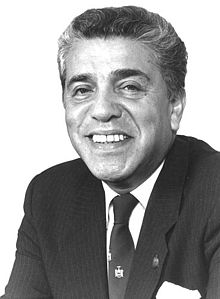Robert Garcia (Robert Garcia)

Robert Garcia was born in Bronx, New York of parents born in Puerto Rico. His father was born in Coamo and had worked in the Central Aguirre sugar mill on the island’s south coast; his mother was born and raised in Ponce. They had migrated to New York City from the island in the 1920s; being born on the island, the Jones Act of 1917 had made them U.S. citizens, their ship bypassing Ellis Island and docking directly at Brooklyn. He attended the New York City public schools and graduated from Haaren High School in Manhattan in 1950. He served in the United States Army from 1950-53 during the Korean War as a radio operator with the Third Infantry Division. He continued his education from 1953-57 by enrolling in the City College of New York, although he also attended the Community College of New York as well as the RCA Institute. After graduation, he worked as a computer engineer with IBM Control Data, from 1957-65. Garcia’s first experience in politics was circulating nominating petitions for John F. Kennedy’s 1960 presidential bid, and he quickly became active in local politics along with Herman Badillo under the tutelage of Felipe Torres. Garcia was elected a Democratic member of the New York State Assembly in 1966 and 1967. On March 28, 1967, Robert Garcia was elected to the New York State Senate, to fill the vacancy caused by the resignation of Eugene Rodriguez. He retained his seat in the Assembly until the end of the session of 1967. He took his seat in the State Senate at the beginning of the 1968 session and remained in the State Senate until 1978, serving in the 177th, 178th, 179th, 180th, 181st and 182nd New York State Legislature. In the Senate he was Deputy Minority Leader from 1975 to 1978. He was a delegate to the 1976 Democratic National Convention.
He took a keen interest in prison conditions at New York’s correctional facilities. As a result, at the outbreak of the Attica Prison riot in early September 1971, he was asked by Republican Governor Nelson Rockefeller to serve on the Mediation Committee sent into the burning prison along with Badillo and others. 39 hostages and inmates were killed, and 89 others were wounded, when state troops stormed the prison. A Democrat, Robert Garcia was first nevertheless elected to Congress (95th United States Congress) from the Bronx on the Republican and Liberal tickets on February 14, 1978, to fill the vacancy caused by the resignation of Herman Badillo; He took his seat on February 21, 1978 as a Democrat, however, after being accepted by the Democratic Caucus in the House. He was re-elected to the 96th, 97th, 98th, 99th, 100th and 101st United States Congresses. Garcia remained in Congress until January 7, 1990, when he decided to resign following his trial on charges by US Attorney Rudy Giuliani that he was linked to the Wedtech scandal. The over-arching case that came to be known as the Wedtech Scandal stemmed from Bronx defense contractor Wedtech’s loans from the Small Business Administration (SBA), a Federal entity, which was giving special loans to minority-owned businesses in the 1980s. Wedtech had been founded by a Bronx native of Puerto Rican descent, John Mariotta, but one of his partners, Fred Neuberger, quietly acquired more than 50% ownership, suddenly making the company ineligible for the special SBA treatment and millions of dollars in government contracts. Wedtech continued to claim it was minority-owned anyway. That initial Federal government investigation mushroomed into something much, much larger… the result of an overzealous prosecutorial approach that would end up implicating more than 20, both in government and in business. He and his wife were both convicted, he of extortion but his conviction was reversed by the Appellate Court after he had served three months in jail. Following the reversal of his conviction, Robert Garcia joined Charles Colson’s “Prison Fellowship” program, which he developed to minister to those in prison. Both Garcia’s father and sister, Aimee, had become pastors in the Pentecostal Church, and Garcia worked with Colson for a time. He continued to consult for public and private-sector clients on the mainland U.S. and Puerto Rico and continued to do so with Garcia Associates. Garcia died from an infection due to his emphysema on January 25, 2017 in San Juan, Puerto Rico, sixteen days after his 84th birthday.
Born
- January, 09, 1933
- USA
- Bronx, New York
Died
- January, 25, 2017
- USA
- San Juan, Puerto Rico
Cause of Death
- complications from emphysema

